Key takeaways:
- Offsite data storage is essential for protecting information from local disasters and ensuring accessibility, highlighted by personal experiences of data breaches and workflow disruptions.
- When choosing an offsite provider, prioritize factors such as reputation, security measures, scalability, access speed, and support services to ensure reliability and peace of mind.
- Consider the total cost of ownership when evaluating offsite storage, accounting for hidden fees and the balance between quality and cost to avoid future headaches and data security risks.
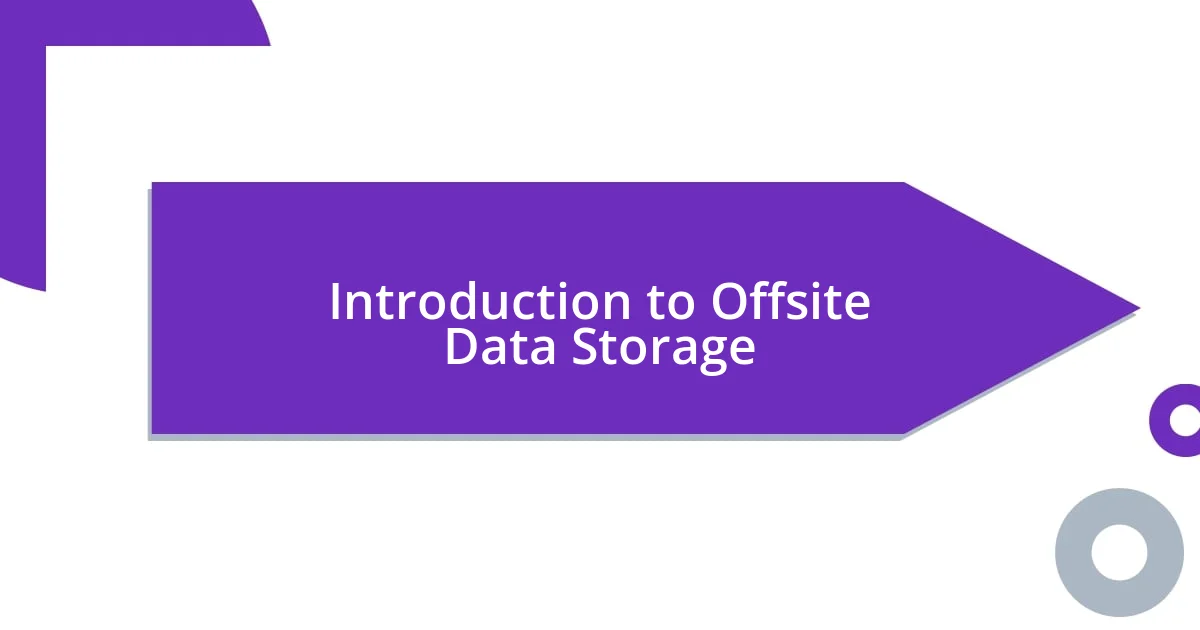
Introduction to Offsite Data Storage
Offsite data storage has fundamentally changed how businesses and individuals safeguard their information. I remember when my company faced a sudden data breach; the sheer panic I felt highlighted the importance of having our data stored securely away from the main office. It made me question—what’s the point of investing in technology if we aren’t prepared for the unexpected?
It’s fascinating to see how offsite data storage offers a safety net. Whether through cloud services or physical storage facilities, these solutions not only protect against local disasters but also ensure that your data is accessible from anywhere. Personally, the peace of mind I gained from leveraging such services during a big project made it clear—offsite storage isn’t just a joke I tell about my basement being full of old drives, it’s a necessity.
In an era where data is considered an asset, relying solely on onsite solutions can feel risky. I often think about how our reliance on traditional storage methods can lead to vulnerabilities. The emotional weight of losing critical information can’t be overstated, and offsite storage provides a solution that counters that fear. Have you ever pondered how your operation would cope after losing crucial data due to unforeseen circumstances?
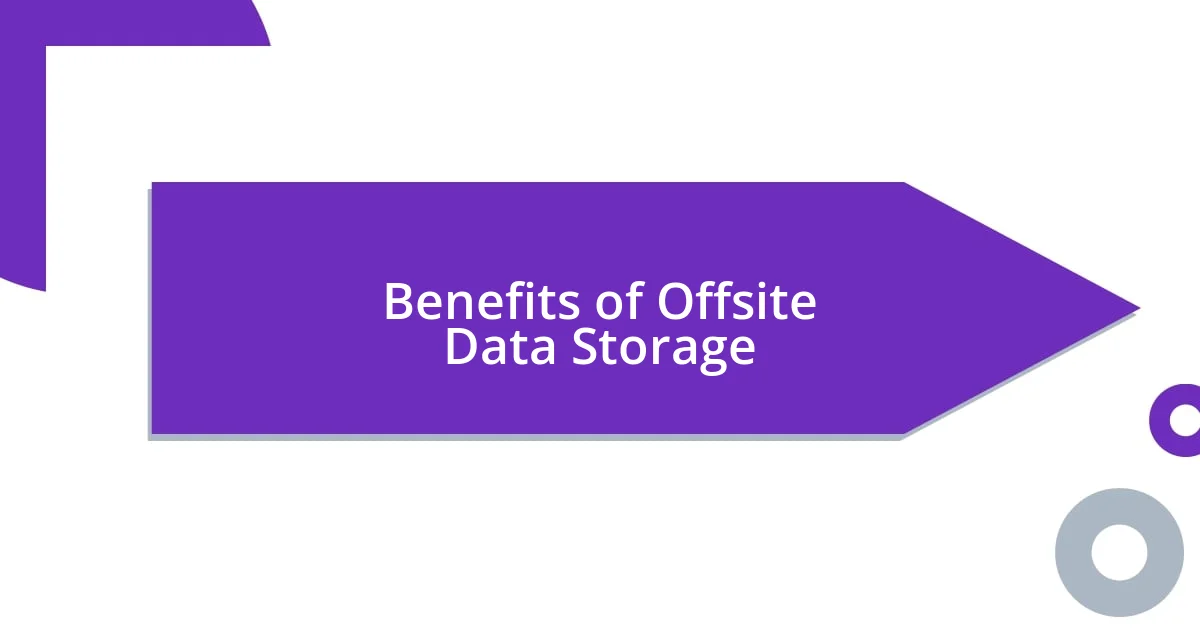
Benefits of Offsite Data Storage
Offsite data storage offers significant benefits that often go beyond mere convenience. I’ve had firsthand experience where migrating our data offsite meant that when a server malfunction occurred, our workflow remained uninterrupted. Knowing that my critical files were safely stored elsewhere gave me the freedom to focus on what really mattered—serving our clients without missing a beat.
Another benefit is the scalability of offsite solutions. When my team decided to expand our operations, choosing an offsite storage provider allowed us to effortlessly increase our capacity without the need for costly onsite upgrades. It struck me just how efficient these services can be; I didn’t have to worry about physical limitations or managing hardware—everything was just a click away!
Lastly, the inherent security features of offsite data storage cannot be overlooked. My own experience with data encryption and automatic backups demonstrated that our sensitive information was protected from unauthorized access and potential loss. In an age where cyber threats loom large, it really affirmed my belief that offsite storage is not merely a backup—it’s a robust safeguard.
| Benefit | Personal Experience |
|---|---|
| Continued Accessibility | Saved my team during a server crash |
| Scalability | Effortlessly expanded storage as we grew |
| Enhanced Security | Protected sensitive data through encryption |
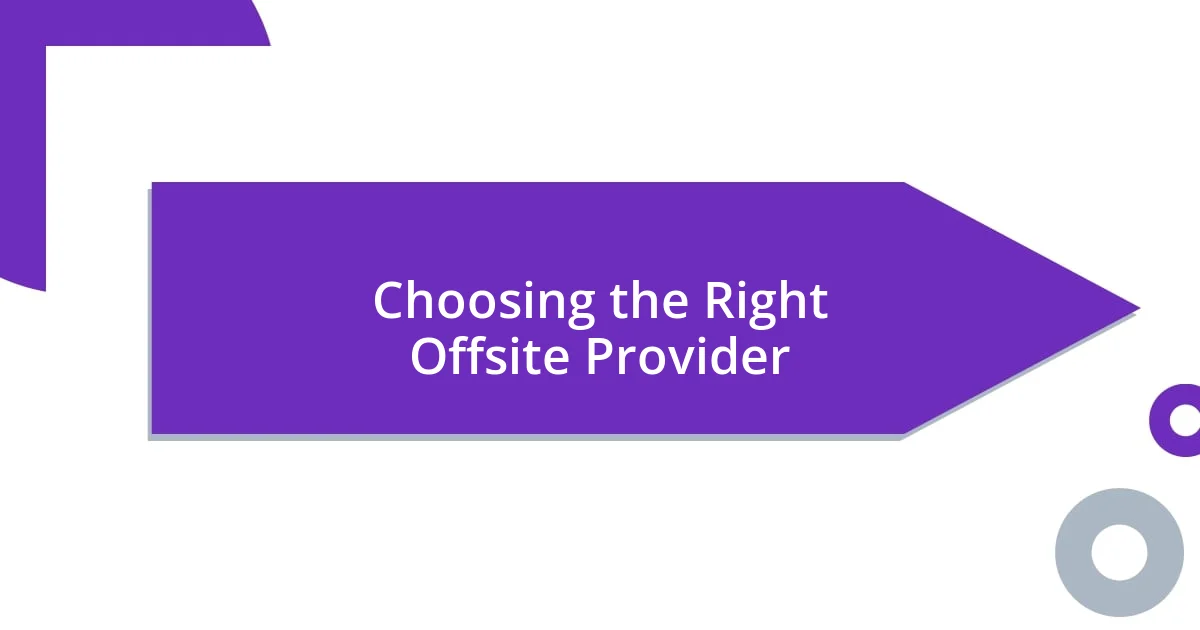
Choosing the Right Offsite Provider
Choosing the right offsite provider is crucial for safeguarding your data effectively. I’ve always emphasized the importance of conducting thorough research before committing to a provider. In my experience, asking the right questions can reveal a lot about their reliability and support. For example, I once overlooked how a provider’s customer service could impact our operations. A single incident of delayed support made me realize the value of responsiveness in a crisis.
Here are some key factors to consider when choosing an offsite data storage provider:
- Reputation and Reviews: Look for provider reviews to gauge customer satisfaction. A good reputation often reflects reliable service.
- Security Measures: Ensure they offer robust security features, like encryption and multi-factor authentication. Your data deserves the best protection!
- Scalability Options: It’s essential they can grow with your needs, especially if you envision expansion. I learned the hard way that what works today may not suffice tomorrow.
- Access Speed and Location: Assess how quickly you can access your data, particularly for emergency situations. I once waited too long for data retrieval during an urgent project, which was a stressful experience.
- Support Services: Evaluate the availability and expertise of their support team. Understanding that help is accessible can provide immense peace of mind.
Finding a reliable provider isn’t just a checkbox on your to-do list; it’s about fostering resilience in the face of uncertainty. Each decision you make can profoundly affect your data’s safety and your peace of mind.
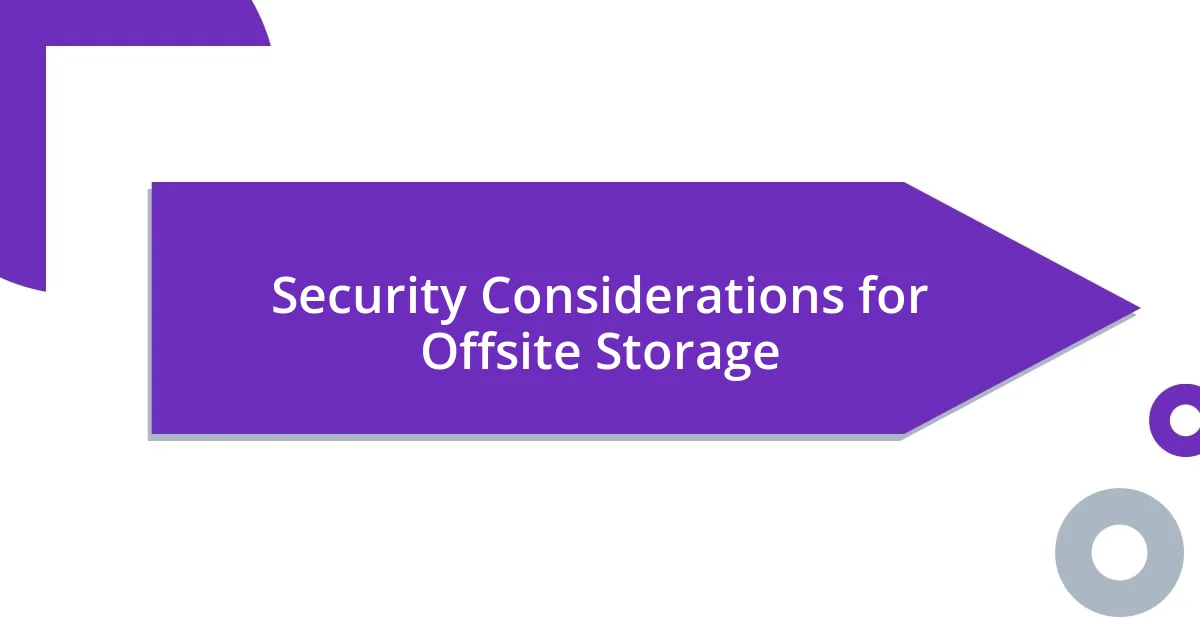
Security Considerations for Offsite Storage
Security is a paramount concern when it comes to offsite data storage. I vividly remember the unease I felt when I first considered moving sensitive client files offsite. To ease my worries, I ensured that the provider I chose utilized advanced encryption protocols. This experience taught me that if data is encrypted both during transit and at rest, it significantly reduces the chances of unauthorized access. There’s a sense of security that comes from knowing your data is locked behind layers of digital protection.
Another aspect I couldn’t overlook was the physical security of the data centers themselves. When I visited one of the facilities, I was struck by the multi-tiered security measures in place, from biometric access controls to 24/7 surveillance. It made me wonder—what would happen to my data in case of a physical breach? It turns out, the peace of mind offered by these safeguards is invaluable. Securing not just the data but the very location it is stored adds an extra layer of reassurance that I now consider essential.
Furthermore, compliance with regulations is equally important. I’ve learned that many industries have strict guidelines for data protection, especially healthcare and finance. During my tenure, I had to ensure our provider adhered to GDPR and HIPAA regulations. Realizing that there were legal implications tied to data mishandling made me more diligent in my choices. Have I chosen a partner that understands the legal landscape? This question is a game-changer in ensuring data integrity and compliance, and it is crucial for establishing trust in today’s data-driven world.
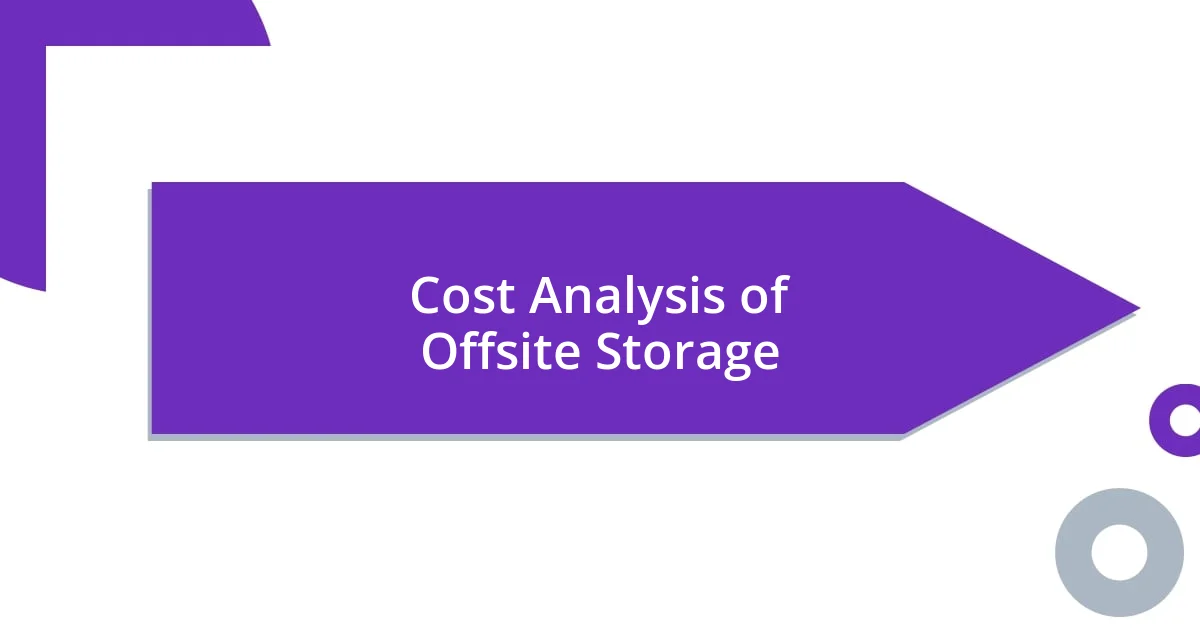
Cost Analysis of Offsite Storage
Cost is often a primary concern when evaluating offsite data storage solutions, and I can definitely relate to that hesitation. When I first considered offsite storage, I was shocked by the array of pricing models providers offered. Some charged monthly fees based on storage volume, while others focused on data retrieval frequency. I realized that digging into these details could save me from unexpected costs down the line. Have you ever had a surprise expense that derailed your budget? I can assure you; those moments are best avoided!
In my experience, the initial cost can be tantalizingly low, but I quickly learned about the hidden fees that can creep in. For example, I once encountered a provider that promised a great rate but charged steep fees for data retrieval and additional security features. This made me wonder—how often do we look at just the price upfront without considering the long-term implications? I learned to factor these “add-ons” into my overall cost analysis, ensuring I knew exactly what I’d be paying over time.
Another angle to consider is the balance between investing in quality and cutting costs. I once chose a less expensive provider, thinking I was being savvy. However, I soon discovered that the lack of robust security and support led to data breaches, costing not only money but also my trust. It’s evident that while saving a few bucks might feel gratifying, the peace of mind and reliability offered by a reputable service can ultimately save you from much larger headaches down the road. Have you weighed the long-term benefits against the initial savings? Trust me; this reflection can be a game-changer in your decision-making process.














